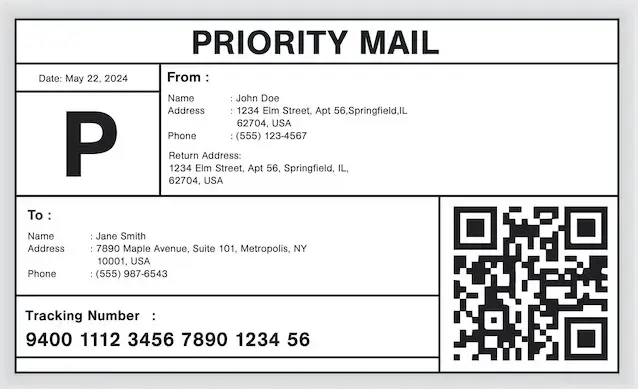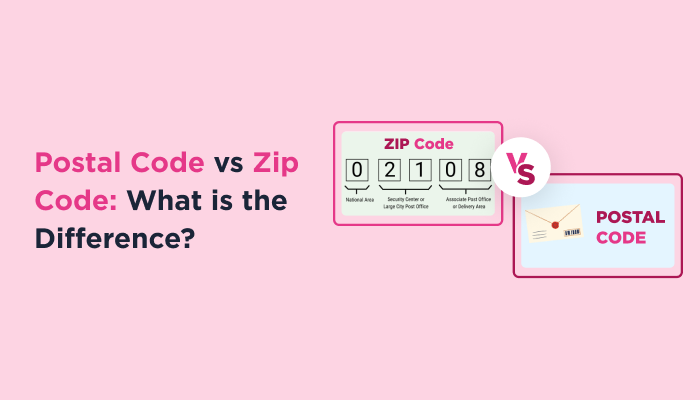Postal Code vs Zip Code: What is the Difference?
While filling an online form or shipping a package, there’s usually a confusion between postal code vs zip code. This situation often brings up a subtle question. Herein, you are bound to reflect on what’s the difference between zip code and postal code and whether they can be used interchangeably?
Usually, it serves a similar purpose. But let’s dig a bit deeper to understand how zip codes and postcodes are different. These two are used to specifically identify a geographic region for mail delivery. However, the terminology and formatting differs based on your location. Thus, if you want to understand how to specifically find my post code or my postal code or my zip code lookup, then this post is for you. Let’s dive in for a more nuanced understanding.

Technically, a postal code is a series of letters and/or digits which are a part of a mailing address and helps identify regions, districts, or addresses to facilitate efficient mail sorting and delivery. National Postal Services across most countries use this system, however, the formats are bound to differ.

In the ongoing discussion of postal code vs zip code, it’s time to explore the meaning of zip code. One key distinction between postal and zip code is the geography. ZIP code is the term used exclusively in the United States. It typically stands for Zone Improvement Plan. The term has been in practice since 1963 after being introduced by the United States Postal Service (USPS). It has helped improve the speed and accuracy of mail delivery services across the US.
Zip codes by state helps identify a specific area in the US. It can range from a single building in dense urban areas or a large geographical zone in rural locations.
Here’s a clear breakdown to help you see how these two systems differ:

Well, not all postal codes look the same. The format, naming, and use cases differ largely from country to country. Let’s take a tour of various countries to understand their postal systems.
Usually, it serves a similar purpose. But let’s dig a bit deeper to understand how zip codes and postcodes are different. These two are used to specifically identify a geographic region for mail delivery. However, the terminology and formatting differs based on your location. Thus, if you want to understand how to specifically find my post code or my postal code or my zip code lookup, then this post is for you. Let’s dive in for a more nuanced understanding.
What is a Postal Code?

Technically, a postal code is a series of letters and/or digits which are a part of a mailing address and helps identify regions, districts, or addresses to facilitate efficient mail sorting and delivery. National Postal Services across most countries use this system, however, the formats are bound to differ.
Where is the postal code used?
The term postal code is a standard word used in many countries outside the United States. It includes countries like,- United Kingdom (known as postcode)
- Canada (alphanumeric format like M5V 3L9)
- India (called PIN code, for instance 110001)
- Australia, South Africa, and most of Europe
Various Postal Code Formats
- Numeric only: A common format in countries like India or Germany.
- Alphanumeric: Used in Canada, UK, and the Netherlands
Why Postal Codes Matter:
Apart from its utility in mail delivery, postal codes are also used in the following situations.- E-commerce shipping.
- Localized search results.
- Tax calculation.
- Checking regional service eligibility.
- Address validation in online forms.
What is a Zip Code?

In the ongoing discussion of postal code vs zip code, it’s time to explore the meaning of zip code. One key distinction between postal and zip code is the geography. ZIP code is the term used exclusively in the United States. It typically stands for Zone Improvement Plan. The term has been in practice since 1963 after being introduced by the United States Postal Service (USPS). It has helped improve the speed and accuracy of mail delivery services across the US.
Zip codes by state helps identify a specific area in the US. It can range from a single building in dense urban areas or a large geographical zone in rural locations.
Where is ZIP code used?
- Specifically in the United States region.
- The term ZIP code is not used by other countries, however, can be mistakenly applied while referring to international postal systems.
- It is a common search query to look out for my ZIP code, ZIP code of my location, or Zip codes by state while identifying and validating US addresses.
What is the ZIP Code Format
- A standard Zip code is specifically a 5-digit number. For instance, 90210.
- There’s an extended format as well called the Zip+4. It includes a hyphen and an additional four digits to facilitate precision. For example 90210-1234.
- Is Zip code 6 digit is a usual query. However, in the U.S., it is always either 5 or 9 digits.
Why are ZIP Codes Important?
Just like postal codes, Zip codes also offer a greater functionality beyond mail delivery. The following list suggests why they matter.- Checking the local delivery eligibility of a specific location.
- Helps calculate online shipping charges for each location.
- Supports in Government services and census data collection.
- Helps personalize search results and advertisements.
- For accurate forms and address validation.
Example of ZIP codes
- New York City: 10001
- Los Angeles: 90001
- Chicago: 6060
Postal Code vs Zip Code: The Key Differences
Postal Codes and Zip codes primarily help streamline mail delivery. However, it’s not just in the semantics. Understanding the clear difference between ZIP code and postal code helps users and website owners to ensure accuracy and provide better user experience.Here’s a clear breakdown to help you see how these two systems differ:
| Feature | Postal Code | ZIP Code |
| Used In | Most countries worldwide | United States only |
| Term Origin | Generic term for mail sorting codes | Stands for Zone Improvement Plan |
| Format | Numeric or alphanumeric | Numeric only (5 or 9 digits) |
| Example | K1A 0B1 (Canada), 110001 (India) | 90210, 10001-1234 |
| Governing Authority | Varies by country | USPS (United States Postal Service) |
| Alternate Names | Postcode, PIN code | ZIP code only |
| Global Lookup Tools | Postcode finder | ZIP code lookup |
Common Use Cases & Importance
Understanding these differences isn’t just for trivia. It has real-world applications from online shopping to marketing or even emergency services. Checkout the following section on how these tiny codes come into play and matter much more than you realize.1. E-commerce & Shipping Accuracy
During online shopping, a correct postal or Zip code ensures that,- Your package is routed efficiently.
- Proper delivery fees and timelines are calculated.
- The address auto-completion tools function properly.
2. Tax Calculation & Regulatory Compliance
Many times, a Zip code vs postal code helps determine the following things.- Applicable sales tax
- Local laws or local service availability
- Environmental fees like battery shipping in electronics.
3. Website Form Validation
Most online forms include fields for Postal Code or ZIP codes. This is important for country-specific validation, real-time error prevention, and smooth user experience.4. Location-Based Personalization
Various businesses and websites use postal codes and zip codes for the following reasons.- Deliver region-specific content and deals.
- Customize varied search results and local service options.
- Identify serviceable areas specifically for home services, food deliveries, or any other FMCG deliveries.
5. Data Analysis & Targeted Marketing
Postal code vs zip code also helps various marketers and data analysts in the following ways.- Checkout the current customer distribution by area.
- Helps optimize regional ad targeting.
- Supports the building of segmented email campaigns.
Global Variations: Postcode Systems Around the World

Well, not all postal codes look the same. The format, naming, and use cases differ largely from country to country. Let’s take a tour of various countries to understand their postal systems.
Canada: Canadian ZIP Codes (aka Postal Codes)
- Often mistaken as ZIP codes, but the correct term is postal code
- Uses an alphanumeric format like K1A 0B1
- Each character has meaning—region, district, and more*
- Users frequently search for Canadian ZIP codes out of habit or confusion
United Kingdom: Postcodes
- Known as postcodes, not ZIP codes
- Format: EC1A 1BB (area, district, sector, unit)
- Very precise—can identify a single building
India: PIN Codes
- Postal codes are called PIN codes (Postal Index Number)
- Format: 6-digit numeric, e.g., 110001
- The first digit denotes the zone, next two the sub-region, etc.
Australia: Postcodes
- Numeric 4-digit codes (e.g., 2000 for Sydney)
- Used across cities, suburbs, and regional areas
Germany: Postleitzahl (PLZ)
- 5-digit postal codes (e.g., 10115 for Berlin)
- Introduced in 1993 to streamline delivery systems
Quick Lookup Tools Around the World
To deal with so many formats, people often rely on:- Postcode finder to locate postal codes by address
- Zip code lookup for U.S.-based results
- Tools like ARForms to build region-specific forms with smart ZIP/postal code validation
Conclusion
Thus, depending on your area of service, the utility between postcodes and zip codes differ. Every region has their specific format wherein each letter or number depicts something. You must know your specific zip code or postcode in order to fill out your addresses accurately in a form. It would help ensure specific rates, offers, delivery charges, shipment days, etc.FAQs
Is a ZIP code the same as a postal code?
Well, not exactly. In comparing postal code vs zip code, zip code is the system specifically catering to the United States Postal System. On the other hand, postal code is a broader term that serves multiple nations internationally. Their purpose is the same, to help identify specific locations for mail delivery. But the name and format differs for regional use.Is ZIP code 6 digits?
A standard Zip code used in the U.S. is technically either 5 digits or 9 digits in the Zip+4 format. The confusion arises while looking at other postcodes of India that are 6-digits.Is ZIP code for city or state?
A ZIP code can represent- A specific part of the city,
- A rural area,
- A military base,
- Any large business or organization.



